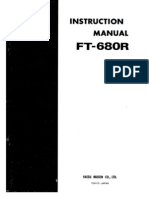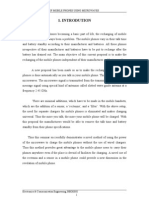Nvis As-2259
Nvis As-2259
Uploaded by
Job ArrosCopyright:
Available Formats
Nvis As-2259
Nvis As-2259
Uploaded by
Job ArrosOriginal Title
Copyright
Available Formats
Share this document
Did you find this document useful?
Is this content inappropriate?
Copyright:
Available Formats
Nvis As-2259
Nvis As-2259
Uploaded by
Job ArrosCopyright:
Available Formats
NVIS1
Build Your Own AS-2259 Type NVIS Antenna
Parts List
3 ea 1.5" PVC pipes 5' long
2 ea 1.5" PVC coupling
2 ea 1.5" PVC cap
4 ea egg type insulators
3 ea brass round head screws (1/2" 6-32)
2 ea brass round head screw (1" 6-32)
4 ea lock washers for 6-32 screws
6 ea brass hex nuts (6-32)
4 ea flat #6 brass washers
1 ea SO-239 chassis connector with solder pot center pin
1 ea SO-239 coax crimp on type
4 ea stakes
1 ea round metal stake 3/4" by 18"
4 ea heavy solder lugs to fit brass screws (you "could" use crimp on type)
4 ea plexaglass pieces, 1" X 3", hole drilled through each end
~150' copper antenna wire (braided/woven type like Davis Flexweave works
best)
~60' nylon rope (Parachute type cord works great and is inexpensive)
~17' RG-58 (coax for center mast feedline)
|-------- 42.5'
------------|
Next
http://home.centurytel.net/w9wis/NVIS1.html [26-07-2008 20:04:12]
NVIS2
Construction Details
Drill a PVC Cap to accept SO-239 (7/8") and 4ea #6 screws, lock washers and nuts.
Make sure to center the SO-239 in the hole before drilling the 4 screw holes. Lock washers go
under the nuts. 3 screws are 1/2" and the other is 1".
Cut off the head of a 1" #6 brass screw and solder it in the center post of SO-239
Cut antenna wires to length plus a little
Fit one end of each wire with solder lugs
Fit the other with the egg insulators and parachute cord or other non conductive rope which serves
as guy ropes on the ends of the 4 elements. Two guy ropes should be at least 7.5' long for the 38
foot antenna wires and 20.5' long for the 25 foot antenna wires. Locate the 4 Plexiglass pieces and
drill 3/8" holes on each end. Slip the guy rope through one hole and tie it to the other. See picture
on last page if you have trouble visualizing this... These pieces allow you to pull the plexiglass
piece up the guy to shorten it and adjust the tension of each guy. The total length of each
element... wire and guy... is about 45 feet.
Next
http://home.centurytel.net/w9wis/NVIS2.html [26-07-2008 20:04:58]
NVIS3
Drill hole in center of second end cap (3/4") and run round steel 18" X 3/4" rod through the center. I
purchased the rod at Menard's Home Center and it would also be available it Home Depot, Lowes
or similar home centers. This is the bottom section and the center stake helps when setting up the
antenna.
Drill a 3/4" hole near the bottom of one end of one of the 5' pieces of pvc pipe. After drilling the hole
run one end of 17' of RG-58 coax through the pipe and out the hole. Crimp a SO-239 on this end.
Crimp a PL-259 on the other end. The long end is run through the pipes before erecting the
antenna as a coax feed. Alternately you can just run a long piece of coax to the top but I thought
this was quicker and easier. I leave the coax in the bottom section and feed to the connector in the
top when I assemble the antenna. You may find it easier to leave the coax in a coil and feed from
the top through the bottom.
Install pipe coupling to one end of the pipe as seen above. Install a coupling to the remaining pipe
as well. The couplings need not be glued... in fact I didn't glue any of the caps or couplings and
they seem plenty sturdy for the purposes of the support mast.
Next
http://home.centurytel.net/w9wis/NVIS3.html [26-07-2008 20:05:21]
NVIS4
Put the top cap with SO-239 on top of what will be the top section of PVC pipe. Attach wire elements
to the top cap as shown in the drawings, also illustrated below...
Drive the section with the bottom cap and spike into the ground. Assemble the other two sections
together and then hoist onto the lower section. This is MUCH easier with two people but with
practice tyou can assemble it yourself. Just be careful in case it falls over.... hehehe.
Extend the wires as in the diagrams and attach the guy ropes to the stakes. The stakes should be
located 42.5 ft from the center mast of the antenna so the wire elements form crossed dipole-like
antenna sections. Thread the Plexiglass pieces onto the guy ropes.Snug up the guy ropes to
straighten the antenna mast using the Plexiglass pieces you made earlier... they make it easy to
adjust the guys. Check out the phots which follow and you'll get a better idea of how to make
the Plexiglass guy tensioners. I bought power cord holders at a home center to wrap the wire and
guys on and labeled each (38 or 25)... they were 2 for a dollar so it was really a deal. Using these for
guy and antenna wire storage really helps things stay neat when I break down the antenna
and store it in it's bag.
The antenna works NVIS mode from about 3.5 to 11 MHz. It's generally necessary to use a tuner
with this type of antenna... then it's useful from 2 - 30 MHz.... the high bands are not NVIS however.
If you build this antenna let me know how it works for you. I use a LDG Z-11 auto tuner with my
Argonaut V and it works great !
http://home.centurytel.net/w9wis/NVIS4.html (1 de 2) [26-07-2008 20:05:41]
NVIS4
HOME
http://home.centurytel.net/w9wis/NVIS4.html (2 de 2) [26-07-2008 20:05:41]
You might also like
- How To Fly IFRDocument337 pagesHow To Fly IFRGuillermo Sánchez100% (1)
- Grosman, A. - 'Rameau and Zarlino. Polemics in The Traite de L'harmonie'Document17 pagesGrosman, A. - 'Rameau and Zarlino. Polemics in The Traite de L'harmonie'Mauro Sarquis100% (1)
- Monitoring-Times Magazine Mar 1996Document116 pagesMonitoring-Times Magazine Mar 1996Benjamin Dover100% (1)
- Cleartone Tetra Cm9000Document3 pagesCleartone Tetra Cm9000Mike MarineNo ratings yet
- Yavapai County Scanner Frequencies (AZ)Document3 pagesYavapai County Scanner Frequencies (AZ)blazerman3No ratings yet
- LEVD (Villanubla) : General InfoDocument11 pagesLEVD (Villanubla) : General InfoMiguel Angel MartinNo ratings yet
- End Fed 6 - 40 Meter Multiband HF AntennaDocument6 pagesEnd Fed 6 - 40 Meter Multiband HF AntennalimazulusNo ratings yet
- Xiegu g90 Cheat Sheet v1.71 11 1 2019Document10 pagesXiegu g90 Cheat Sheet v1.71 11 1 2019PxistaNo ratings yet
- QDX: RP Labs Igital CVR (Transceiver) : Operating Manual, Firmware 1.03Document37 pagesQDX: RP Labs Igital CVR (Transceiver) : Operating Manual, Firmware 1.03fox7878No ratings yet
- VHF and Nvis Rapid DeploymentDocument3 pagesVHF and Nvis Rapid Deploymentyoung-ThucidNo ratings yet
- A Nvis-Ale Log-Spiral Antenna For 2.5-12+ MHZDocument17 pagesA Nvis-Ale Log-Spiral Antenna For 2.5-12+ MHZBharata BadranayaNo ratings yet
- Nvis ProjectDocument38 pagesNvis ProjectAnnu KumariNo ratings yet
- A68 RF Hardware Trouble Shooting Guide - WO - SA - A8960 - 1001 PDFDocument56 pagesA68 RF Hardware Trouble Shooting Guide - WO - SA - A8960 - 1001 PDFDnw DigitalprintingNo ratings yet
- Radio User - Vol. 16 No. 07 (Jul 2021) (TruePDF)Document67 pagesRadio User - Vol. 16 No. 07 (Jul 2021) (TruePDF)Al KNo ratings yet
- Commercial-Style CP Dipole FMDocument5 pagesCommercial-Style CP Dipole FMStephen Dunifer100% (2)
- Walkman Wonder MW LoopDocument3 pagesWalkman Wonder MW Loopmax_orwellNo ratings yet
- Disaster Guide 2022Document28 pagesDisaster Guide 2022api-385077512No ratings yet
- FT-817 Mods: Battery Mod For ft-817Document43 pagesFT-817 Mods: Battery Mod For ft-817Arturo MejiaNo ratings yet
- Monitoring Times 1997 06Document124 pagesMonitoring Times 1997 06Benjamin DoverNo ratings yet
- MD380 User Guide PDFDocument10 pagesMD380 User Guide PDFucnopNo ratings yet
- Tadiran HF-8000Document4 pagesTadiran HF-8000Angel Loayza Ortiz100% (2)
- Tiny Spectrum AnalyzerDocument29 pagesTiny Spectrum AnalyzerWalter BenitesNo ratings yet
- CQ Amateur Radio 05-2019Document116 pagesCQ Amateur Radio 05-2019testNo ratings yet
- Radiolink Se100 Gps User Manual2016.7.13 PDFDocument6 pagesRadiolink Se100 Gps User Manual2016.7.13 PDFNasukhaNo ratings yet
- 10M Ham CB Base AntennaDocument8 pages10M Ham CB Base AntennaHuy Ngọc QuáchNo ratings yet
- Collins URG-IV DsDocument2 pagesCollins URG-IV DsMarco PoloNo ratings yet
- Cobra RadiosDocument3 pagesCobra RadiosTodd HoferNo ratings yet
- 73 Magazine - March 2003Document68 pages73 Magazine - March 2003radioscribdNo ratings yet
- New World Map4 PDFDocument1 pageNew World Map4 PDFvkasNo ratings yet
- RM Italy KL703 ManualDocument6 pagesRM Italy KL703 ManualpadawerNo ratings yet
- Yaesu FT-680R Instruction ManualDocument50 pagesYaesu FT-680R Instruction ManualYayok S. AnggoroNo ratings yet
- Serval rd10 Xga 04 EditedDocument3 pagesServal rd10 Xga 04 EditedWen OhaNo ratings yet
- RLXIB - IHN - W - User - Manual AnthenaDocument167 pagesRLXIB - IHN - W - User - Manual AnthenaAllen BradleyNo ratings yet
- Samsung LE40C750R2 N86ADocument113 pagesSamsung LE40C750R2 N86AkevinalleinNo ratings yet
- The British Breakers Mag.: CB Care Convoy Free Radio Rig TestDocument60 pagesThe British Breakers Mag.: CB Care Convoy Free Radio Rig TestAl KNo ratings yet
- 73 Magazine 12 December 1990Document92 pages73 Magazine 12 December 1990dikeyNo ratings yet
- Radio User 2019 011 - NovemberDocument72 pagesRadio User 2019 011 - NovemberAl KNo ratings yet
- Vk5br Eh Dipole AntennaDocument12 pagesVk5br Eh Dipole AntennaInsafe El WakiliNo ratings yet
- Invisible Antenna080406Document8 pagesInvisible Antenna080406Nicola RizziNo ratings yet
- FT-857 Internal MeterDocument1 pageFT-857 Internal Meterwayan.wandira8122No ratings yet
- Paaragraphs: Annual Home Brew NightDocument12 pagesPaaragraphs: Annual Home Brew NightSidney Daros JuniorNo ratings yet
- The ElektorDSP Radio Part 1Document6 pagesThe ElektorDSP Radio Part 1testNo ratings yet
- TechSmart 94, July 2011, Home Entertainment IssueDocument32 pagesTechSmart 94, July 2011, Home Entertainment IssueTS_MikeNo ratings yet
- Hallicrafters S-40B Photofact Jan1951Document7 pagesHallicrafters S-40B Photofact Jan1951MAID ArtNo ratings yet
- Ic-7300 WSJT-XDocument6 pagesIc-7300 WSJT-XCostinNo ratings yet
- SBIR GovDocument4 pagesSBIR GovgrenzoNo ratings yet
- TDMADocument21 pagesTDMAHussain BarwahwalaNo ratings yet
- Owner's Manual 77-120 ESPDocument13 pagesOwner's Manual 77-120 ESPbellscbNo ratings yet
- 09 September 1988Document108 pages09 September 1988Monitoring TimesNo ratings yet
- HQ 170aDocument82 pagesHQ 170aTony WellsNo ratings yet
- Access and Backhaul Consolidation With NG Pon2 140402085548 Phpapp01Document15 pagesAccess and Backhaul Consolidation With NG Pon2 140402085548 Phpapp01nguyenpttNo ratings yet
- PRC150Document118 pagesPRC150Antonio RodriguezNo ratings yet
- Por TELE-satellite 1107Document212 pagesPor TELE-satellite 1107telesatelliteporNo ratings yet
- Test Report Uniden Bearcat 980 ENGDocument86 pagesTest Report Uniden Bearcat 980 ENGStephanie Hall100% (1)
- J Pole HandbookDocument10 pagesJ Pole HandbookMR XNo ratings yet
- Schaltungss. B77 MKIIDocument150 pagesSchaltungss. B77 MKIIJVTO79No ratings yet
- CQ Amateur Radio December 2020Document116 pagesCQ Amateur Radio December 2020SathawitNo ratings yet
- Q-MAC HF-90M Frequency Hopping HF SSB TransceiverDocument6 pagesQ-MAC HF-90M Frequency Hopping HF SSB Transceiverdeyede2003No ratings yet
- Folded Bow-Tie AntennaDocument8 pagesFolded Bow-Tie AntennaPunyatoya RautarayNo ratings yet
- W3LPL Improving Your 40 Through 10 Meter Antennas For The Declining Solar CycleDocument39 pagesW3LPL Improving Your 40 Through 10 Meter Antennas For The Declining Solar CycleAravind BalasubramanianNo ratings yet
- Grandstream GRP2601 (P)Document2 pagesGrandstream GRP2601 (P)Arthur VrakaNo ratings yet
- Ilovepdf MergedDocument5 pagesIlovepdf Mergedvelin panchevNo ratings yet
- NR Protocol PDFDocument835 pagesNR Protocol PDFHemanth Kumar S NNo ratings yet
- Bufr Reference ManualDocument433 pagesBufr Reference ManualsaagNo ratings yet
- Easergy: Installation and Operation ManualDocument15 pagesEasergy: Installation and Operation ManualLuiz Guilherme Viveros de AlmeidaNo ratings yet
- The Marine ChronometerDocument3 pagesThe Marine ChronometerGiorgi Kandelaki0% (1)
- ETSI EN 300 401: Final Draft V1.4.1Document197 pagesETSI EN 300 401: Final Draft V1.4.1Grimmjow JaegerjaquezNo ratings yet
- Wideband Lpda Antenna: 800 - 6000 MHZ Product Code: Lpda-A0123Document3 pagesWideband Lpda Antenna: 800 - 6000 MHZ Product Code: Lpda-A0123Khalid RiazNo ratings yet
- Radio Broadcasting FilesDocument12 pagesRadio Broadcasting Filesjohn herald odronNo ratings yet
- Service Manual: TelefunkenDocument43 pagesService Manual: TelefunkencarlunchoNo ratings yet
- Removing The PDCCH Bottleneck and Enhancing The Capacity of 4G Massive MIMO SystemsDocument8 pagesRemoving The PDCCH Bottleneck and Enhancing The Capacity of 4G Massive MIMO SystemsD Harish KumarNo ratings yet
- 1-1-1 - HRR-HS-CT - Series - Road Blockers DatasheetDocument2 pages1-1-1 - HRR-HS-CT - Series - Road Blockers DatasheetRaed IsmailNo ratings yet
- Ch-4 Dynamic Characteristics of InstrumentsDocument52 pagesCh-4 Dynamic Characteristics of Instrumentsqasimbilal salarNo ratings yet
- Full01 En071226Document8 pagesFull01 En071226JOSE CASIQUENo ratings yet
- Transmission Line TransformersDocument7 pagesTransmission Line Transformersdavid reyesNo ratings yet
- Upac Analog DC Ultra Slimpak Analogue Transmitter DCDocument2 pagesUpac Analog DC Ultra Slimpak Analogue Transmitter DCJoseph YumulNo ratings yet
- ATS Emergency Response ChecklistsDocument57 pagesATS Emergency Response ChecklistsNguyễn Đình LongNo ratings yet
- CRO Part 3 Z-ModulationDocument4 pagesCRO Part 3 Z-Modulationsnehalbansode8262No ratings yet
- EE 234 Experiment 2newDocument6 pagesEE 234 Experiment 2newFantasiaMariamNo ratings yet
- Wireless Charging of Mobile Phones Seminar ReportDocument23 pagesWireless Charging of Mobile Phones Seminar ReportDevesh Kumar Verma83% (6)
- Antena Mikro StripDocument18 pagesAntena Mikro StripJoepiter JohanNo ratings yet
- Security System Owner's Manual: Interactive Technologies Inc. 2266 North 2nd Street North St. Paul, MN 55109Document61 pagesSecurity System Owner's Manual: Interactive Technologies Inc. 2266 North 2nd Street North St. Paul, MN 55109Carlos Enrique Huertas FigueroaNo ratings yet
- Experiment No. (5) Single Sideband Modulation: ObjectDocument4 pagesExperiment No. (5) Single Sideband Modulation: ObjectFaez FawwazNo ratings yet
- Internet-Of-Things (Iot) : Summer Engineering Program 2018 University of Notre DameDocument42 pagesInternet-Of-Things (Iot) : Summer Engineering Program 2018 University of Notre DameMAFOQ UL HASSANNo ratings yet
- Samsung Galaxy F22 SM-E225F Service ManualDocument34 pagesSamsung Galaxy F22 SM-E225F Service ManualDeepak D PillaiNo ratings yet
- TM-281A/ TM-281E: Instruction Manual Mode D'EmploiDocument81 pagesTM-281A/ TM-281E: Instruction Manual Mode D'EmploiCpgc ControlNo ratings yet
- Comparaison AlgosDocument5 pagesComparaison AlgosLamiae SqualiNo ratings yet
- Passengers Speakers Audio Connection - v1.2Document1 pagePassengers Speakers Audio Connection - v1.2Beñat LarrañagaNo ratings yet
- Definition Line Coding Characteristic of Line Coding Types of Line Coding Unipolar-NRZ Polar - (NRZ-L, NRZ-I)Document13 pagesDefinition Line Coding Characteristic of Line Coding Types of Line Coding Unipolar-NRZ Polar - (NRZ-L, NRZ-I)kanon chakmaNo ratings yet
- 212 Mte 2023Document2 pages212 Mte 2023nabaye3390No ratings yet

























































































